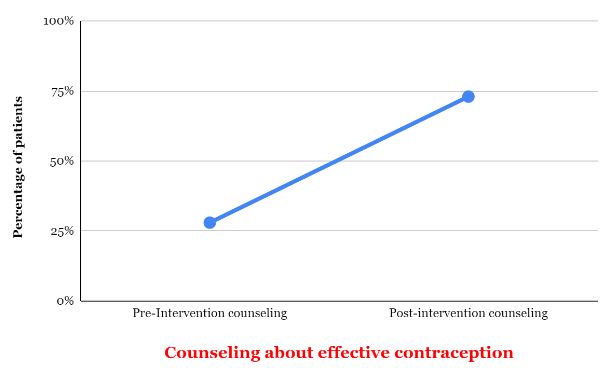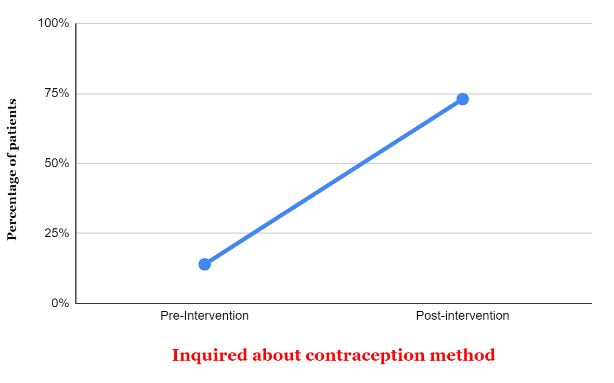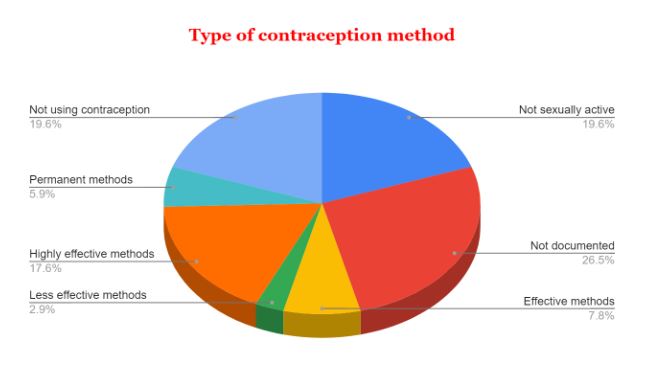Session Information
Session Type: Poster Session A
Session Time: 10:30AM-12:30PM
Background/Purpose: RMD patients are at increased risk of adverse pregnancy outcomes either from the active disease itself or the use of immunosuppressants incompatible with pregnancy. Inadequate education often leads to the underutilization of effective and safe contraception. The adverse pregnancy outcomes and teratogenesis necessitate adequate counseling of birth control methods and ensuring compliance. According to ACR guidelines for the management of reproductive health, IUD and implants is considered as a highly effective method; progestin only pill, depo medroxyprogesterone acetate, oral contraceptive as effective, and condom as a less effective method. It is preferred to either use a highly effective method or to combine two other forms of contraception. We aimed to improve counseling about appropriate contraception methods for RMD patients on teratogenic medications.
Methods: This quality improvement (QI) project retrospectively analyzed the medical records of 60 female patients of reproductive age with RMDs who were on methotrexate, leflunomide, mycophenolate mofetil, mycophenolic acid, and cyclophosphamide. The initial data (pre-intervention phase) was collected from June 2022 to August 2022 at two University of Florida College of Medicine clinic sites, in Jacksonville. Counseling regarding effective and safe contraception methods during random clinic sessions was recorded. Interventions included educating residents, fellows, faculty, and ancillary staff periodically about the current ACR guidelines for the management of reproductive health and creating flyers. A smart phrase was generated in the electronic health system for teratogenic medications, their pregnancy-related adverse effects, forms of contraception including their effectiveness, and Risk Evaluation and Mitigation Strategy (REMS) form education. A subsequent retrospective chart review of 60 patients was performed in January 2023 to June 2023 to analyze the impact of interventions.
Results: Pre-intervention data showed a significant need for improvement in contraception counseling. Only 14% of patients were inquired about the type of contraception methods and < 30% were counseled on effective methods. Post-intervention, the percentage of women with documented birth control counseling increased to 73% along with documentation regarding type of birth control methods (Figures 1 and 2). Around 51% of patients were taking mycophenolate, 40% on methotrexate, and 9% on leflunomide. None of the patients was taking cyclophosphamide. Around 20% of patients were sexually active but not using any contraception (Figure 3). These patients were offered gynecology referral in addition to appropriate counseling by rheumatology staff.
Conclusion: This QI project demonstrates the importance of integrating contraception counseling into routine rheumatology visits for women of childbearing age, especially those on teratogenic medications. We developed various resources (handouts, electronic smart-phrase) that facilitated the conversation about birth control and improved documentation. This project adds to the growing evidence that contraception counseling is crucial for optimal reproductive health in RMD patients.
To cite this abstract in AMA style:
Kaur I, Kaeley G, Arcilla C, Par N, Myant T. Contraception Counseling for Patients with Rheumatic and Musculoskeletal Diseases (RMDs) at a Tertiary Care Rheumatology Clinic: A Quality Improvement Project [abstract]. Arthritis Rheumatol. 2024; 76 (suppl 9). https://acrabstracts.org/abstract/contraception-counseling-for-patients-with-rheumatic-and-musculoskeletal-diseases-rmds-at-a-tertiary-care-rheumatology-clinic-a-quality-improvement-project/. Accessed .« Back to ACR Convergence 2024
ACR Meeting Abstracts - https://acrabstracts.org/abstract/contraception-counseling-for-patients-with-rheumatic-and-musculoskeletal-diseases-rmds-at-a-tertiary-care-rheumatology-clinic-a-quality-improvement-project/



